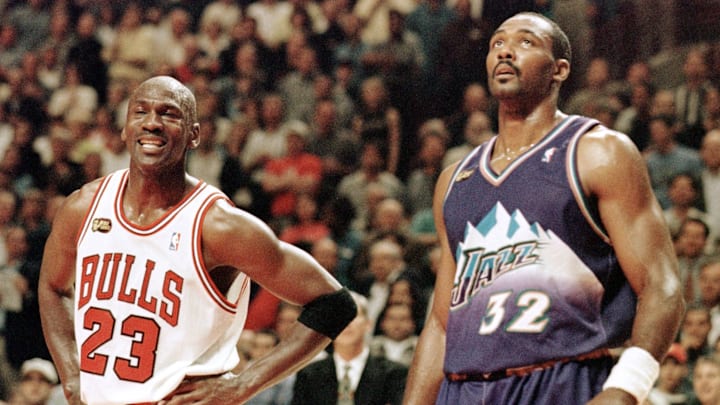The NBA Finals are supposed to be the pinnacle of a season, a balanced matchup between the two best teams in the league. But things don't always come out even. In 73 years, just 18 NBA Finals have gone to seven games and we've even seen 10 sweeps.
On a game-to-game level, NBA Finals history is also filled with some massive swings. A whopping 53 finals games have been decided by 20 points or more and these are the biggest blowouts in NBA Finals history.
Biggest single-game blowouts in NBA Finals history
MARGIN | SEASON | MATCHUP | FINAL |
|---|---|---|---|
+42 | 1998 | Bulls over Jazz | 96-54 |
+39 | 2008 | Celtics over Lakers | 131-92 |
+36 | 2013 | Spurs over Heat | 113-77 |
+35 | 1978 | Bullets over Sonics | 117-82 |
+34 | 1985 | Celtics over Lakers | 148-114 |
+34 | 1961 | Celtics over Hawks | 129-95 |
+33 | 2016 | Warriors over Cavs | 110-77 |
+33 | 2000 | Pacers over Lakers | 120-87 |
+33 | 1992 | Bulls over Blazers | 122-89 |
+33 | 1984 | Lakers over Celtics | 137-104 |
+33 | 1982 | 76ers over Lakers | 135-102 |
+33 | 1965 | Celtics over Lakers | 129-96 |
It's not surprising to see the Lakers and Celtics so heavily represented here as, collectively, they'd played in 320 NBA Finals games, more than the next seven teams combined. It is somewhat impressive, however, that the Celtics have been on the winning side of four of the biggest blowouts in Finals history, and on the losing side of just one. The Lakers have been on the winning side of just one of these blowouts, but on the losing side for five of them.
The only team besides the Celtics with more than one NBA Finals win by 33 or more points is the Jordan-era Bulls who did it in Game 1 of the 1992 Finals and in Game 3 of the 1999 NBA Finals. That 49-point win over the Jazz is the largest blowout in NBA Finals history.
Incredibly, six of the teams responsible for blowouts here did not end up winning the series:
- The Spurs beat the Heat by 36 points in Game 3 of the 2013 Finals to take a 2-1 lead. They lost the series in seven games.
- The Celtics beat the Lakers by 34 points in Game 1 of the 1985 Finals but lost the series in six games.
- The Warriors beat the Cavs by 33 points in Game 2 of the 2016 Finals to take a 2-0 lead. They eventually took a 3-1 series lead but infamously lost in seven games.
- The Pacers beat the Lakers by 33 points in Game 5 of the 2000 Finals. They already trailed 3-1 in the series going into that game and were eliminated in Game 6.
- The Lakers beat the Celtics by 33 points in Game 3 of the 1984 Finals to take a 2-1 lead but eventually lost the series in seven games.
- The 76ers beat the Lakers by 33 points in Game 5 of the 1982 NBA Finals. They were eventually eliminated in Game 6.
All that is to say that even if you see your favorite team getting hammered in an NBA Finals game, it doesn't necessarily mean they're doomed. However, if a team is getting hammered more than once, it's probably over. Here are the biggest total scoring margins for a single NBA Finals series.
Biggest scoring margin for an entire NBA Finals
MARGIN | SEASON | MATCHUP | SERIES |
|---|---|---|---|
+70 | 2014 | Spurs over Heat | 4-1 |
+63 | 1965 | Celtics over Lakers | 4-1 |
+62 | 1961 | Celtics over Hawks | 4-1 |
+60 | 2018 | Warriors over Cavs | 4-0 |
+59 | 1981 | Celtics over Rockets | 4-2 |
+55 | 1960 | Celtics over Hawks | 4-3 |
+50 | 2008 | Celtics over Lakers | 4-2 |
+49 | 1971 | Bucks over Bullets | 4-0 |
+49 | 1991 | Bulls over Lakers | 4-1 |
+47 | 2009 | Lakers over Celtics | 4-1 |
+47 | 1998 | Bulls over Jazz | 4-2 |
Just three of the series above include one of the games from the list of largest individual blowouts of all time. And, once again, we see some familiar teams — the Celtics on the winning side five times, the Jordan-era Bulls on the winning side twice, the Lakers on the losing end three times. Also, you have to recognize the Spurs who lost Game 2 of the 2014 Finals to the Heat by two points and won the other four by 15, 19, 21 and 17, respectively.
